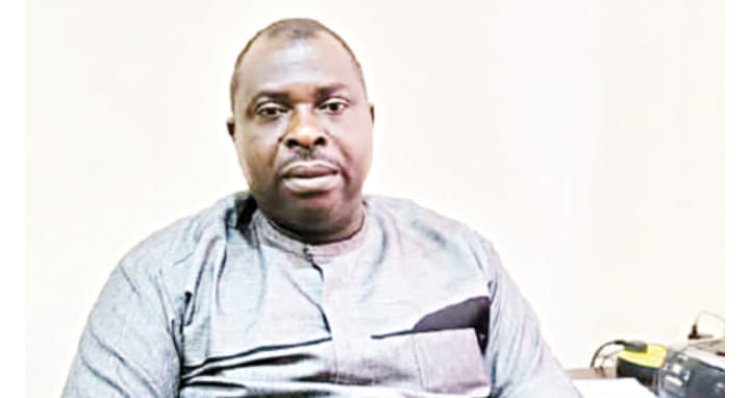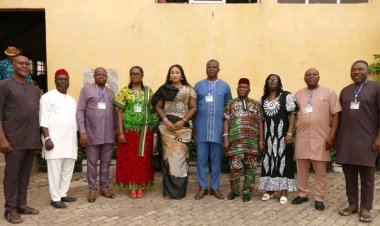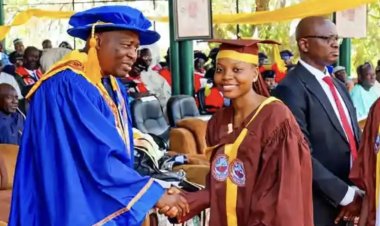Meet Dr Kolade Owolabi Best Mathematics Scientist in Nigeria and Best Researcher in FUTA
Abstract teaching scares students away from maths - Dr. Kolade Owolabi Best Mathematics Scientist in Nigeria and Best Researcher in Federal University of Technology, Akure (FUTA)

Abstract teaching scares students away from maths - Dr. Kolade Owolabi Best Mathematics Scientist in Nigeria and Best Researcher in Federal University of Technology, Akure (FUTA)
Dr Kolade Owolabi is a lecturer at the Department of Mathematics, Federal University of Technology, Akure. He was adjudged the best Mathematics scientist in Nigeria by Research.com Ranking for 2022. In this interview with PETER DADA, he speaks about the education sector in Nigeria among other issues
You recently emerged as the best Mathematics scientist in Nigeria. How did you achieve it?
Before this pronouncement, in 2021, I emerged as the best researcher in FUTA. I saw the award as an encouragement because all I was doing was just pleasing myself. I was not competing with anybody. I love doing something in my way. I don’t have a friend. I don’t go to parties. When I leave my office, I go straight to my house. I don’t watch TV.
I go straight to my computer to work. If I’m sleeping and an idea comes up to my mind, I wake up quickly and write it down; even if it is in the middle of the night.
Talking about this recent achievement, in 2021, most of my papers were linked to the University of Freestate, South Africa. So during the ranking, I was ranked with that university (in South Africa). In that country, I was ranked number five.
That ranking was based on the one-year post-doctoral work that I did at that university. I was placed number five in that country at the time. At the time, we were only either six or seven in South Africa that made the list. Later, when I came back, people were asking why I was always attached to that university, so I changed to FUTA.
This current ranking was based on the work I did with FUTA. I have other professors that I work with, in universities in the South Africa, Turkey, the United States, and Mexico among others.
I have some other people that I collaborate with, though 100 per cent of the work comes from me. A tree cannot make a forest, sometimes you need to work with these top people.

For you to excel, you need to open a Google scholar account, so that when you publish a paper your work will be seen automatically.
This ranking is based on the impact of my publications. A lot of people come up with better ideas in Nigeria but where they choose to publish the idea is vital. Some people just want a journal that will say yes immediately. I don’t wait for journals to publish my paper before I start writing another one once I have an idea. Sometimes, I will have a list of 10 to 15 ideas, and I will still be on one, once I finish that one, I won’t stop, I will start the next one.
Then the impact of that work shows how often other people are using what you proposed. That’s where the citation comes in.
Some people’s total citation till the end of their career is not up to 200 because of the way their work is being published.
All together, how many papers have you published?
I have over 150 publications, including two textbooks, one conference paper, and over 150 certified papers published in ISI paper factor journals. I don’t just publish in any journal; I choose to publish where it matters. To publish a single paper, you will have to pay $3,800, so because I know the quality of what I did, and I will never opt for an open-access option to publish my paper. I will always let it be a subscription-based publication.
I only have my work in PDF format. If you work with these journals, your work will be seen everywhere in the world, and people will start citing your work and using your materials. If you want to quote what I did, you will have to refer to it, so that’s how I get citations.
Does that mean someone has to subscribe before getting access to your work?
Yes, they subscribe, pay, and when you pay to the journals, they can give you access to download them.
How do you get paid for this work?
I’m not getting paid. If it is open access, I will pay the publication fee so they will give me full access. But according to my books, I was given a certain amount of money in euros; they paid me off once, so whatever they make thereafter is none of my business. The other book on Amazon in Germany, on the other hand, when it sells, take a small percentage, either 1 percent or 0.5 percent, and give it to me.
Many students dread mathematics and regard it as a difficult subject. What can you say about this?
I tell my students that you just have to see mathematics as something that you have to get along with because, in those days, we called it everyday arithmetic. The study of mathematics is not that difficult, like the way people portray it. It’s just a matter of interest. Some people see mathematics as a science subject. It depends on how you see it.
To me, maths is something that requires critical thinking; you must be ready to sacrifice your time. You have to discipline yourself about the subject, and you need to be dedicated to the study it.
What can be done to make the subject attractive to students?
People can be attracted to the mathematics by tailoring the teaching to applicable areas—the application aspect of it.
If you check the World Health Organisation’s page, you will see a lot of models that have been done.
The models will predict what needs to be done to curb that disease. They will tell us those factors that are responsible for the spread of the disease and how to counter them. We are not just giving out models without a solution, which is more or less like a theory. We give a solution to a particular problem. We design a problem—how it looks—and then give a solution to it.
So for us to make mathematics attractive to our youths, and to those people coming behind, our narratives around the teaching should be changed. We shouldn’t make it look so abstract; we should teach mathematics with good examples—simple examples with practical things that students can see and assimilate easily.
As a mathematician, how can the subject be applied to solve various problems facing Nigeria?
It can be used to solve problems that we are facing in Nigeria. It’s just that the government has not been giving it the desired attention. All these researches that we have been doing, by the time we finish them, we will publish the outcome either in form of term papers or textbooks but everything ends there. We don’t have companies to execute all those results.
Unlike in South Africa, people in academics, work hand in hand with people outside, they have projects. The company brings projects to the university, they look for scholars in academics to help them handle those projects. They only need to work with the results of the project but around here in Nigeria, we do research here to have a promotion. Everything ends there because we don’t have companies that will execute them.
I asked a similar question from our lecturer when I was in the university, those equations we were doing, in which area were they applicable?
Then he told to us that those people producing bombs were using them. Those of us studying mathematics, especially in the department, have different areas such as optimisation, and mathematical biology.
There are two options under mathematical biology which are epidemiology and mathematical ecology. We have solid mechanics, which deals with engineering. There are lots of applications in engineering, bridges and structures. Then we have people in fluid dynamics, who deal with fabrication in engineering. For most of the things they use, we mathematicians are the ones defining the models.
Most of the programmes or packages you see today are written by mathematicians. Computer scientists are just end-users of the packages.
Then, in our financial institutions, we are the ones designing the software they use in such a way that the system won’t be hacked.
So, everything has a programme. Mathematicians are behind all those things. Every company requires the service of a mathematician, either in banks, schools, or anywhere. Mathematicians are useful in society but nobody wants to study mathematics, people are running from it.
How can scholars help in solving Nigeria’s problem in the education sector?
The only way to solve most of the challenges we have in the sector is for the government to give it the attention it deserves. If you look at the Nigerian budget over the years, you will that the government has been allocating 2.5 or 2 per cent to the education sector, and most of the money won’t even come down.
So the government needs to give maximum attention to education; at the very least, they should increase the budget that they give to education and provide proper funding for education.
The government should try to do that, and should fund the education system.
Education is the bedrock of development; any country that fails to fund education will find it hard to develop.
In the USA, they give 25 to over 30 per cent of their budget to education; do we think they are not wise because they believe education will solve the challenges they are facing?





